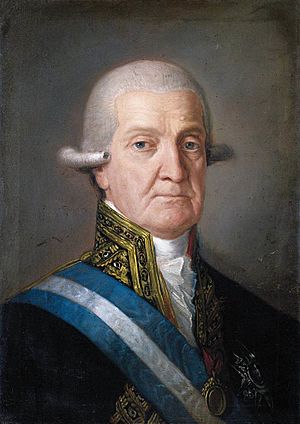Martín Álvarez de Sotomayor facts for kids

Martín Antonio Álvarez de Sotomayor y Soto-Flores, 1st Count of Colomera (1723–1819) was an important Spanish general. He served his country in many wars and held high positions in the government. He was known for his military skills and leadership during a time of big changes in Europe.
Contents
Martín Álvarez de Sotomayor: A Spanish General
Martín Álvarez de Sotomayor was born in 1723. He began his military career at a young age. His first major experience in battle was in Italy. This was during the War of the Polish Succession, which took place from 1733 to 1735. This war involved many European countries. It helped Sotomayor gain early experience as a soldier.
Early Military Career
As he grew older, Sotomayor continued to rise through the ranks. By 1762, he had become a marechal de camp. This was a high military rank, similar to a major general today. In this role, he took part in the war with Portugal. This conflict was part of a larger European war called the Seven Years' War. Sotomayor showed his leadership skills during these campaigns.
Leading the Great Siege
One of Sotomayor's most famous roles was during the Anglo-Spanish War. From 1779, he led the Great Siege of Gibraltar. A siege is when an army surrounds a place to try and capture it. The Great Siege of Gibraltar lasted for several years. It was a very long and difficult military operation.
Sotomayor was in charge of the Spanish forces trying to take Gibraltar. However, in 1782, his role changed. He was then put in command of only the Spanish part of the forces. The siege continued, but Gibraltar remained under British control.
Later Life and Achievements
After the siege, Sotomayor continued to serve his country. From 1788 to 1790, he was the viceroy of Navarre. A viceroy was a governor who ruled a region as a representative of the king. This was a very important political position.
Martín Álvarez de Sotomayor also became a minister in the government. He received the Order of Charles III, which is a high honor in Spain. This award recognized his long and dedicated service. He passed away in 1819. He did not have any children.
See also
 In Spanish: Martín Álvarez de Sotomayor para niños
In Spanish: Martín Álvarez de Sotomayor para niños
 | Roy Wilkins |
 | John Lewis |
 | Linda Carol Brown |

